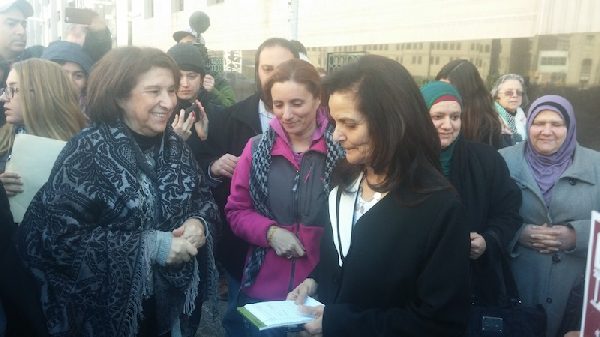|
||
|
CINCINNATI — A federal court of appeals ruled in favor of Palestinian activist Rasmea Odeh, who had been found guilty of immigration fraud for failing to disclose that she was jailed in Israel on her U.S. naturalization application.
The Sixth Circuit Court found that the U.S. District Court in Detroit was wrong in excluding a psychological expert’s testimony, which Odeh’s defense wanted to introduce.
If the prosecution does not succeed in convincing the Court of Appeals to reconsider its decision, the case will be heading back to Detroit.
In 1969, the Israeli military judiciary found Odeh guilty of participating in a bombing in Jerusalem. However, she says the conviction was based on a forced confession obtained by rape and torture.
Her defense had planned to argue that Odeh suffers from Post Traumatic Stress Disorder as a result of the abuse she allegedly endured in Israel. According to defense attorney Michael Deutsch, PTSD affected Odeh’s understanding of the questions on the citizenship application as to whether she had ever been arrested or convicted.
Odeh said she thought the questions only referred to her record in the United States. However, Judge Gershwin A. Drain disallowed the testimony of a psychological expert or the mention of torture at the trial.
The Palestinian activist was convicted in November 2014. In March 2015, she was sentenced to 18 months in jail, but remained free on bond pending appeal.
The appellate judges found the district judge should have allowed PTSD expert Dr. Mary Fabri to testify in front of the jury.
“Dr. Fabri’s proffered testimony is relevant to whether Odeh knew that her statements were false,” a panel of appellate judges wrote in a brief published Thursday. “The District Court accordingly erred in categorically excluding this testimony.”
Deutsch said if Drain does not find a new basis for barring the PTSD evidence, Odeh will get a new trial in Detroit. The prosecution will get a chance to file a motion asking the Court of Appeals to reconsider its decision.
Deutsch said the chance for finding new grounds to exclude Fabri’s testimony is slim.
The attorney added that evidence relating torture will significantly increase Odeh’s chances of obtaining a non-guilty verdict.
“It is compelling evidence of her state of mind when they accused her of knowingly lying,” Deutsch said. “If she suffers from Post Traumatic Stress that has caused her to block this past trauma, then a jury could say she didn’t knowingly lie and find her not guilty.”
Odeh’s supporters say her prosecution is a “political witch-hunt” to crackdown on Palestinian activism in the United States. Her defense tried to argue that the indictment against the defendant was the result of evidence obtained illegally after the FBI raided the homes of 23 political activists in 2010, including the house of Hatem Abudayyeh, the executive director of the Arab American Action Network, where Odeh worked.
Over the past two years, Odeh has acquired a large base of support that included Arab American organizations, civil rights groups, Black solidarity activists and anti-war organizers.
Abudayyeh said the Rasmea Defense Committee is overjoyed.
“We’re hopeful that there will be a new trial,” he said. “It’s great news for Rasmea. It’s great news for her family, for her supporters. We’re very happy.”
The Defense Committee dubbed the ruling a “partial victory”, saying that Odeh’s supporters would have liked the conviction overturned altogether.
“We are hopeful that Rasmea’s full story will be told and that she will ultimately be exonerated of all charges,” the committee said in a statement.
Dawud Walid, the executive director of the Council on American Islamic Relations in Michigan, welcomed the court’s decision, calling the conviction unjust.
“We believed all the time that the prosecution was politically motivated,” he said. “It’s times like this that give us hope that the system could work, even when the prosecutors are motivated by politics.”
|







Leave a Reply